I’m often asked, Do Chickens and dogs get along?
As with so many questions, the answer is, It depends.
Chickens are prey animals. Everyone, from the hawks in the sky, to foxes lurking in the woods, want to eat them. Dogs are predators. Right there, you have a problem. Chickens startle easily. They dash and dart. These are exactly the motions that set a dog into hunting mode. That said, not all dogs are a physical threat to your chickens. What sort of dog do you have?
Do you have a large, athletic dog? Or a little couch potato? I have both.
Scooter is not much of a threat to anything, not even a tennis ball. He would prefer to be curled up in the sun. Still, he is a dog, and despite his ridiculous cuteness, he remains a predator at heart. He could harass the chickens, even a little dog can stress out your flock. Then again, they could harass him! If Scooter did grab a hen, his gnarly undershot teeth wouldn’t do much damage.
On the other hand, Lily dog is always on high alert. In all likelihood, in her first few months of life as an ignored puppy on a farm, she learned to hunt and eat rabbits and such. Added to that history is her highly reactive temperament. When she sees movement, she chases. She tears off like a streak first, and thinks later. This isn’t necessarily a bad thing. The local coyotes, herons, hawks, raccoons (and the list goes on) stay clear of our backyard. But, a dog with such a strong prey drive can’t always distinguish between a chicken scratching in the woods and a squirrel.
Some big dogs are fine with chickens. My late, great Nimbus, was the ideal dog to have with hens. Nimbus was likely an Australian sheepdog and husky mix. She had a very strong prey drive, but she also had the protective sensibility of a herding dog. I owned her for a few years before getting chickens. Once the hens were installed in the backyard, I told Nimbus that they were not toys. All I had to do was say, uh-uh when she tensed to chase or try to play with them. Nimbus got it immediately, and she understood her role. In fact, I’d let the flock free-range with Nimbus there to protect them. The biggest issue that I had with her was that she’d follow the hens and eat their poop. Dogs love chicken manure. They eat it and they roll in it. It’s disgusting. It’s stinky. If that’s too much for you to deal with, don’t worry about how to let your dog mingle with your hens. Keep them separate!
Lily is another story. I knew that with her that I’d have to do systematic and on-going training. I use positive reinforcement to teach Lily that chickens are to be left alone. This is the opposite of what some trainers advocate, called aversion training, which is, when a dog goes after a hen, you yell, yank and punish. That theory holds that the dog associates the chickens with bad things happening to him, and so the dog will avoid the hens. Punishment like that works once. Or twice. The behavior you don’t want immediately stops. With some dogs, that’s enough, and they decide the chickens aren’t worth the trouble. But, for most dogs, and especially for reactive dogs like Lily, that sort of aversion training not only doesn’t work longterm, but it also causes issues that are lasting and damaging to your relationship with your dog.
Dogs, when yelled at and yanked, will build up a tolerance for punishment. So, each time the dog misbehaves, the owner has to escalate to get the desired response. Soon, the owner is physically abusing her dog, and the dog associates not only the chickens with punishment, but the handler as well. At some point that sort of dominance training creates a backlash from the dog. Fear-based aggression ensues. Or the dog shuts down, fearful of doing anything wrong at all. That might look like obedience, but it is not (you see this “learned helplessness” a lot with horses trained in so-called natural horsemanship – more on that another day!)
A better way to train a dog to leave the chickens alone is to reward him for the behavior that you want. Imagine what the perfect scenario is – perhaps your dog lying quietly while the hens mill around. Then, train for that. What’s the first step? Reward for when your dog (on a leash, so he can only do the right thing) is calmly looking at the chickens. If your dog can only be calm from fifty feet away on the porch, then start there. Slowly, day after day, get closer to the flock, all the while rewarding for quiet and relaxed behavior. This sounds like it will take ages, and it does take attention and work, but the end result will happen more quickly than you think. Soon enough your dog will be calm around your hens.
Then again, you might have a Lily. Lily is a very challenging dog to train because of her innate reactive nature. I’ve taught her not to chase the hens from the other side of the fence. I’ve trained a wait! so if she does take off after a stray hen, I can (usually) stop her in her tracks. But I’d never trust her 100% out with free-ranging hens. It’s just not worth the risk.
So, when my dogs are out, my hens are in.
And vice versa.
Note: I’ve enrolled in the Karen Pryor Academy Dog Trainer Professional course. It starts in June. What I’ve talked about here is just the tip of the iceberg when it comes to training theory and knowledge, and is applicable not only to dogs, but to horses and people as well. I’m looking forward to sharing what I learn with you here on this blog, and by next summer I’ll be available for training consultations.
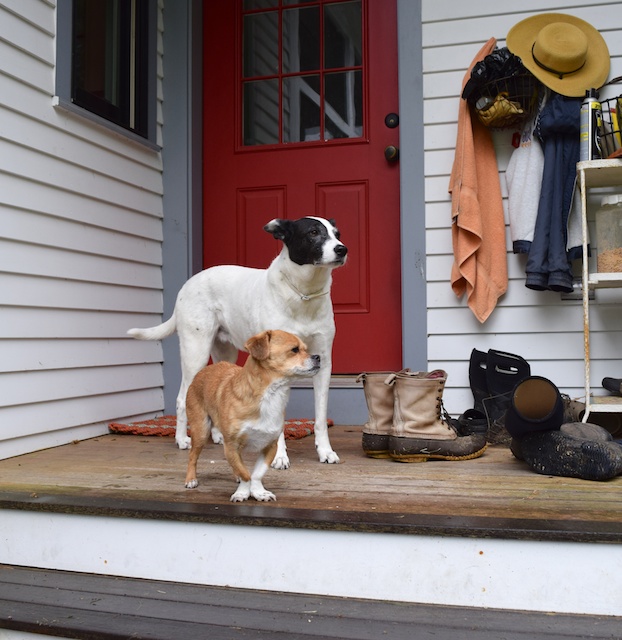
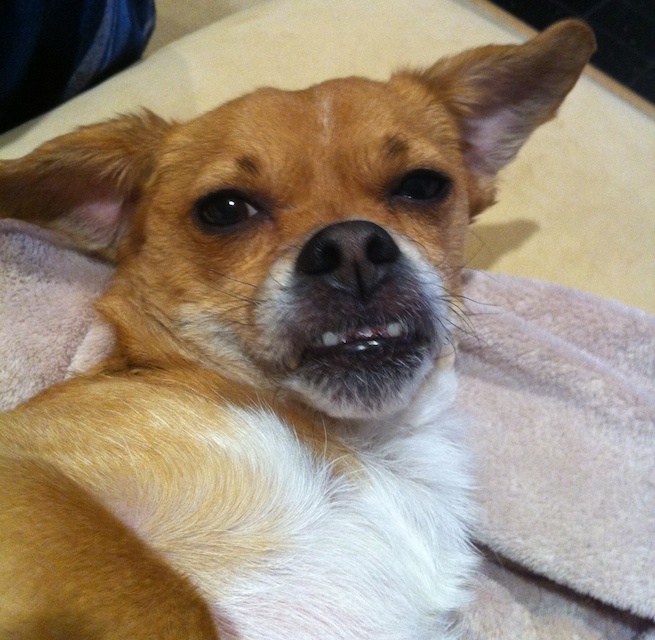
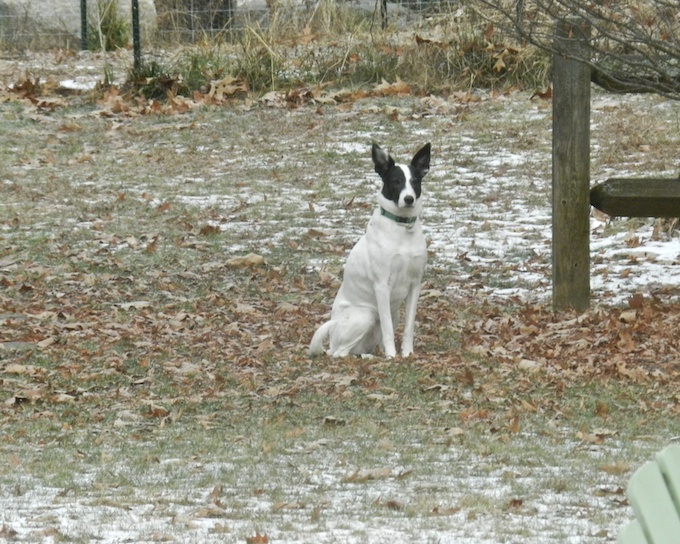
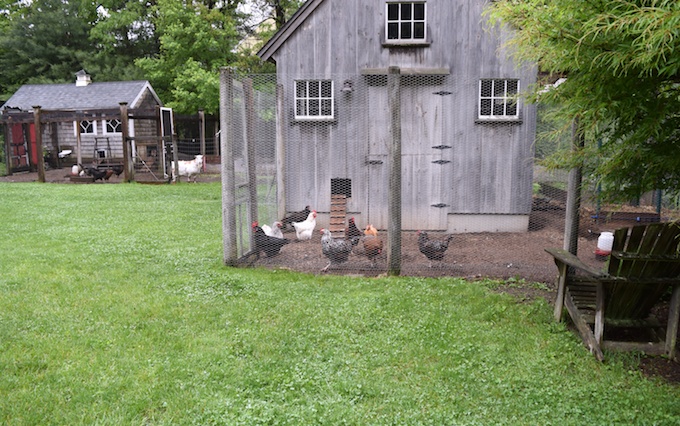
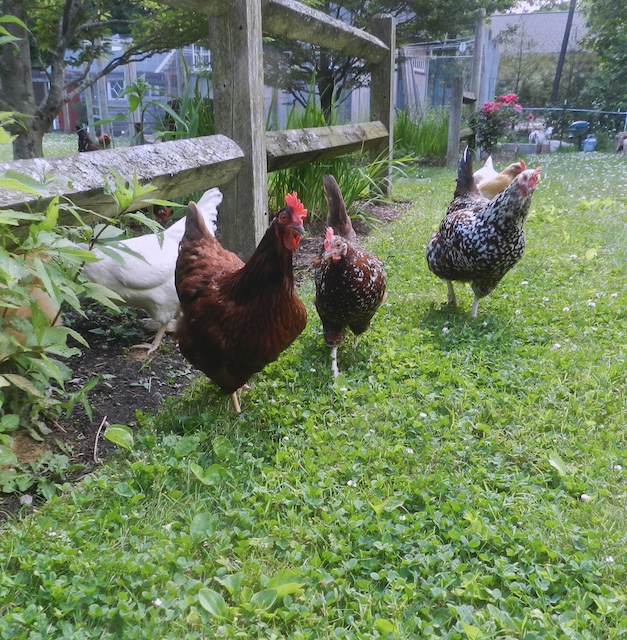
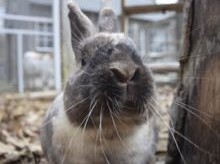
Years ago, before we had chickens, when my golden retriever Midas was alive, he got into the garden which we had some chicken manure delivered…..It was to be tilled into the garden before we planted. He ate it, rolled in it and then vomited in the house. I never smelled anything so disgusting in my life. It took a week and many carpet shampoos to rid the house of the lingering smell. Your story about Nimbus following your girls brought back memories that I can actually laugh at today, never thought it! The great memories he gave us for 14 yrs. out weigh his ‘little slips’. Thanks for the story!
Lily once got into frozen rotted pumpkin. We had to hire a professional house cleaner. Lesson learned? Dump that stuff far in the woods where she doesn’t go.
Luna our chihuahua has the opposite type face of Scooter which is narrow and suited it seems to hunting. She has killed one rabbit already, as for listening to us. She has gotten better, I don’t if this is the right thing to do Terry, but Luana is a reactive dog and gets so instensely into her barking that she won’t listen nor can I distract her. So then if she doesn’t listen to us, she gets picked up and put in time out in her crate. It seems to work and we have had to do it less and less often. We also reward her with treats when she acts calmly around visitors and stays put when we tell her too.
Instead of a time-out (punishment) think about removing Luna from what’s causing her barking as a way to calm her. For Lily, she’s trained, when she starts barking reactively, to go under my desk, which is a calming place for her. Rewarding for calm behavior, as you’re doing, is the key.
My great dane Storm is the most reactive dog I have ever owned. I would not ever let her out when girls are out. Shes gone through extensive training but is such a hand full, she pulled me down a few weeks ago when she saw a dog, I am just thankful I held on and no one got hurt, except me!
I hope you’re okay, now. With reactive dogs, the training never ends. Nor does the vigilance and the management.
I have a 13 yr Blue Heeler very intense barking with autos driving by or kids on bikes an skateboards. I have a couple of whistles an I dont let him see me blow it but ONE blow an he stops barking and comes trotting to me.I just stared the routine a few years ago, sorry I didnt start sooner.
Blue Heelers are brilliant dogs (and, I think, gorgeous!)
do you use chicken manure in your garden? if so how? or when. thanks
I do, but it’s composted first, and while it’s composting, the dogs don’t have access to it! Check my FAQs – I have complete explanation about my manure management.
Some dogs love bunny poop too!! :(
They also love deer poop!
We have friends who have 60 chickens, goats, and ducks and their two Labs are totally trustworthy with them. Go figure! Although, one of the dogs was in training with Canine Companions For Independence and didn’t make it into the program for whatever reason so she has careful breeding and a steady personality anyway. I however would not trust my Golden or Cattle Dog mix for a second. It’s easy enough to let each species have their outside time.
Oh, your lovely Lily, with her very big ears (the better to hear you with…)! The picture of the Gems free-ranging is beautiful!
Great article. We have Corgis and for months after the introduction of chickens to our homestead we had to watch our guy completely. He shook with the urge to snip at them. Literally, shaking not from fear but he knew what we wanted and it was hard to obey. It didn’t take long for him to learn after numerous leashed walks throughout the yard with the chickens that they were not prey. His heard protector genes prevailed. They are his flock now. When we introduced the new corgi puppy, it happened all over again. Now both dogs help patrol the flock, even intervening with the rooster’s ‘advances’ on the hens when it is ‘too aggressive.’ The roosters, dogs, hens all intermingle well. The roosters do like to grab some fluffy fur occasionally as the dogs walk by, and then act like they didn’t do it. It’s comical. We free range with our oldest Corgi guarding the flock all day while we are at work. He takes his job seriously, chasing hawks, buzzards and helicopters (yes he does). We are lucky our house is back a long lane. We adopted a dog though that didn’t work out, she couldn’t contain the prey-drive. We rehomed her after an issue with dog v. Child. Sad day even though it was for the best. She is a shop dog in a business not open to the public now. So, the chicken training wasn’t complete with her. Thought I would add our experience, because people ask this a lot. I agree, it just depends, thanks for your great info as always.
Sometimes rehoming is the best solution – and especially if there’s a child at risk! I love corgis. Scooter’s mom looked like a corgi mix – When I first saw her pups (she was a stray in foster care) I thought that Scooter would be corgi-sized. We were wrong, but somehow he is very right :)
BTW – one thing that you did right (I’m pointing this out for others to understand this) is you never let the dogs chase or get a hen. Once they do something that rewarding for themselves, it’s much harder to train them not to. Keeping the dogs on leashes until they are solidly under control was brilliant. I do believe that Lily had a history of hunting to feed herself before I got her. That’s just about impossible to train out entirely.
Great article! We were lucky with our dog, while we were obedience training our Lab, Bradie the neighbor’s chickens happened to wander into our yard. I took this as an opportunity to train our dog to go “easy” which was our word to be gentle. She responded calmly and gently to the flock and only wanted to sniff their bottoms.
When we added a flock of our own, Bradie is pretty indifferent to them when they are free ranging. I am trying to train her to respond to the chickens’ alarm call.
Bottom sniffing is a reward unto itself :)
Awesome photos, especially the hens!
Great piece, Terry, and what gorgeous photographs. Saving them for a picture book one of these days, I hope.
Congratulations on signing up for the KPA professional dog trainer course. You are going to love it, I think. I hope you will blog the experience.
And what nice comments, thanks everyone for describing your own experiences with dogs and chickens. Goes to show, with care, some dogs will be just fine; and some dogs will never be ok with loose chickens; and so, respecting the biological realities, everyone comes to their own practical solutions.
KP
Karen, I’m so looking forward to getting started. I know I’m just scratching the surface with good training right now. Yesterday, Tonka was high and spooky, the barn was dark and slippery, and he arched his neck and said “no way am I going in there.” Since I’ve already taught him him a “touch” (of a flat, outstretched palm), all I had to do was ask for that touch a couple of times as we walked into the barn. So, instead of conflict and pulling on a scared horse, I had a calm, secure, happy guy. So simple and effective!
I have a Australian Shepherd (mini). His word is ‘be nice’ whether it’s for animals or people. I would take him to my sister’s who had chickens, turkeys and alpacas. He liked to take the tom turkey for a ‘walk’ and would just nose his butt to keep him going around the outside of the chicken coop and back in. Otherwise the turkey would just sit at the feeder. On the other hand, one ground stomp with head down from an alpaca was enough to tell him not to mess with them.
I have been extremely lucky. I have never had an issue with any dog I’ve owned going after my chickens. (I’ve owned a Dalmatian, Scottie, Dach mix, Lab/chow mix, Pom, Poodle/beagle mix and the two I have now a Boston and Rat Terrier Mix)
Every one except for the Dalmatian were rescues.
Lulu by Boston has an extremely strong prey drive. I have to keep an close eye on her in the summer months as she will drive herself to heat exhaustion hunting for rabbits and other vermin. But from day one when I brought her home from the rescue group at the age of one she just didn’t show much interest in them. The only thing I did was put her on a leash walk the fence line. I was closet to the fence, when she went to look in I nudged her with my leg to make her look away. I did that only once. (I know Terry negative reinforcement). She simple doesn’t pay any attention to them.
Skip my Rat Terrier mix came along about a year after Lulu and I simple did nothing, he followed Lulu’s lead I suppose.
My Dalmatian who I purchased as a pup followed me to the coop one day like he always did and followed me in. The chickens always ignored him as a pup, they didn’t react so he didn’t. Well about a week into his new home a broody hen sitting in a nest box decided he was too much of a threat and flogged him a good one. He never wanted another thing to do with a chicken again.
Great blog!!
Terry I was wondering if you have any pictures of Nimbus? He sounds like a wonderful dog.
I had Nimbus before I had a digital camera. I’ll have to scan one and put it up. I’ll do that – it’ll be a pleasure to show her off :)
Great post and very timely for me. We are bringing home a 8 week old puppy tomorrow. We have 10 hens right now. I am hoping, starting out as an innocent puppy, the pup might be ‘friends’ with the chickens but I am also realistic. If we have to keep them separate we will. I am looking forward to any wisdom you gleen from your course!
An 8 wk old pup might be innocent, but they have teeth and play/chase/hunt drive. Train the pup to be friends :)
I love scooter’s feet in the first photo. He is clearly practising his ballet moves.